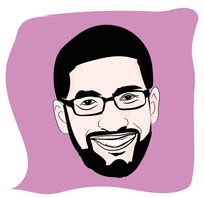Pichai on AI

EARLIER THIS MONTH, Sundar Pichai was struggling to write a letter to Alphabet’s 180,000 employees. The 51-year-old CEO wanted to laud Google on its 25th birthday, which could have been easy enough. Alphabet’s stock market value was around $1.7 trillion. Its vast cloud-computing operation had turned its first profit. Its self-driving cars were ferrying people around San Francisco. And then there was the usual stuff—Google Search still dominated the field, as it had for every minute of this century. The company sucks up almost 40 percent of all global digital advertising revenue.
But not all was well on Alphabet’s vast Mountain View campus. The US government was about to put Google on trial for abusing its monopoly in search. And the comity that once pervaded Google’s workforce was frayed. Some high-profile employees had left, complaining that the company moved too slowly. Perhaps most troubling, Google—a long-standing world leader in artificial intelligence—had been rudely upstaged by an upstart outsider, OpenAI. Google’s longtime rival Microsoft had beaten it to the punch with a large language model built into its also-ran search engine Bing, causing panic in Mountain View. Microsoft CEO Satya Nadella boasted, “I want people to know we made Google dance.”
Pichai’s letter, released on September 5, was buoyant, designed to inspire, and almost giddy in its discussion of the company’s astonishing journey. (You can read it here.) But behind the cheerleading, you could detect a hidden leitmotif. We matter more than ever. Despite what they say. One point pops up repeatedly: We are not going to lose in AI.
Pichai—who joined the company in April 2004, the same month Gmail launched—has been CEO for eight years. He speaks often of growing up in India, where technology provided a lifeline to better times. He’s widely recognized as a “nice guy.” But over the years he has made his share of tough decisions, including layoffs, product cancellations, and reorgs, like his recent forced merger of Google’s two semi-competing AI research centers, DeepMind and Google Brain. Now he faces even bigger decisions as the company withstands challenges inside and out—all while pursuing what Pichai calls “the biggest technological shift” of our lifetimes.
Just before releasing his blog post, Pichai spoke to WIRED about AI, fighting bureaucracy, and why he rejects the characterization that he is mainly a consensus builder. The interview is edited for length and clarity.d and responsible, and meet that moment with excitement.